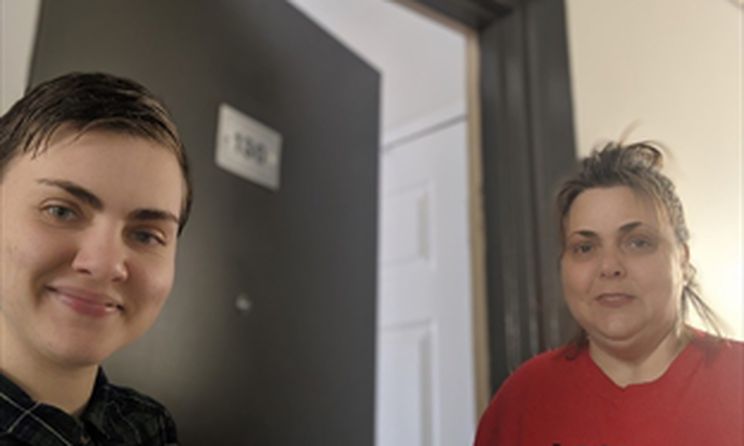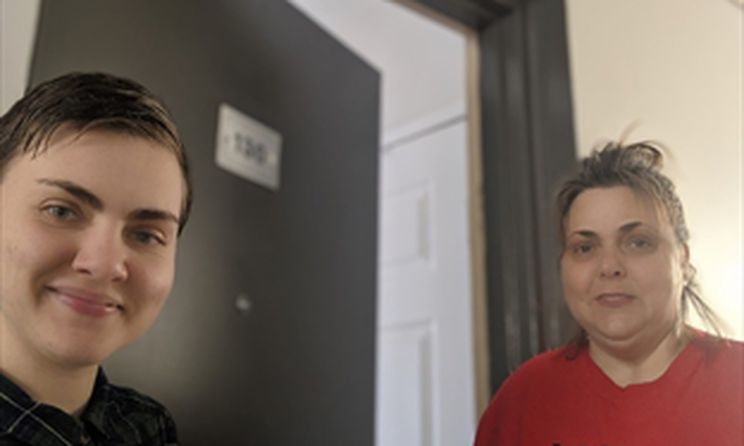Mississauga.com: ‘Absolutely disappointed’: Renters in Mississauga and Brampton as well as Caledon look for action on rising cost of housing
Posted July 26, 2022
Posted July 26, 2022
 “Absolutely disappointed,” said Tanya Burkart, a renter in Brampton who’s holding onto a three-bedroom townhouse. She lives in fear of it becoming unaffordable for her and her family.
“Absolutely disappointed,” said Tanya Burkart, a renter in Brampton who’s holding onto a three-bedroom townhouse. She lives in fear of it becoming unaffordable for her and her family.
Burkart is also a member of and an advocate for Association of Community Organizations for Reform Now (ACORN) Peel. She and other members of ACORN were at Mississauga council on July 5 to hold a peaceful rally asking for changes to Mississauga’s Inclusionary Zoning (IZ) policy, as well as spreading information about the situation many renters in the area face.
The ACORN Peel group was pushing for Mississauga council, through its IZ policy, to increase term limits on affordable housing to 99 years, or beyond. And to increase their set aside rate to 20 to 30 per cent, instead of the 1.5 per cent. This would mean affordable housing stays affordable in perpetuity, and developers must set aside 20 to 30 per cent of units in a new development for affordable housing. Affordable housing, Burkart said, is defined as costing 30 per cent or less of an average annual income of somewhere between $30,000 and $60,000.
“This policy could be phased in,” Burkart said. “It could be implemented by 2025, so it could start at 15 per cent and be increased by two per cent over five years.”
The Region of Peel is developing an IZ policy now and asking each municipality to set their own first. In light of a recent report on rental rates in the GTA, ACORN was hoping for some significant action from Mississauga’s council as a beginning of change in the region. However, Burkart was left disappointed. Mississauga chose to stay with a set aside rate of 1.5 per cent, or just higher, and did not increase the term limits on affordable housing.
“Peel has been on the short end of housing funding for some time,” Burkart said. “In Peel Region there has been a housing crisis for a long time. We have more than 20,000 people waiting for affordable housing. And it wasn’t created overnight. Federal and provincial legislative barriers and programs, stops and starts, have all contributed to this issue and currently there is very little affordable housing. The average one bedroom is over $2,000.”
In fact, according to the Toronto GTA rent report released by Bullpen Research & Consulting and TorontoRentals.com, the average rent in the GTA for all units increased by 5.7 per cent in May, making it the largest monthly increase in three years. The average year-over-year increase from May 2021 to 2022 was 16.5 per cent, and Mississauga specifically was highlighted for condo rentals, which now have an average monthly rent of $2,224, up 12.9 per cent from 2020.
The highest rent growth occurred in Mississauga’s city centre, with rent for condos and apartments rising 28 per cent to $2,728 per month.
“The average GTA rent shot up month over month in May, rising by 5.7 per cent, the highest monthly increase since this data was first reported in 2018,” said Ben Myers, president of Bullpen Research & Consulting. “Investor-owned condominiums led the way, experiencing significant annual growth of 25 per cent from May of last year. High demand for downtown rental properties, coupled with less supply due to rates hikes and delayed occupancies of new projects as a result of labour stoppages and supply chain issues are all contributing factors to the rent inflation.”
Leah Taylor rents a walkout basement in Bolton. She was paying $1,250 a month in rent in a unit she had been in for seven years and was then “reno-evicted” seeing her landlord take the unit back to perform renovations and then subsequently increasing the rental of the unit drastically. All she could find was another walkout basement for $1,850 a month, which includes a requirement to perform annual yard work with the rent.
“We both work full time, and now we’re going to need a side-gig to pay more,” she said. Taylor said she would like to see the backlog cleared at the landlord/tenant tribunal and some legislation around landlords to protect tenants from them simply flipping and hiking the rent of units. “I think they should only allow small rental increases each year,” she said.
Michelle Veinot, director of community resources for Caledon Community Services (CCS) said they are hearing from clients they serve that people who were drastically stretching money are now forced to stretch it so thin they are struggling to maintain housing at all.
“Rising costs, in food, fuel, housing, are seeing people who didn’t have enough before, they don’t have anything now,” Veinot said. “We’re talking about not having the capacity to do anything extra for their families. No emergency funds. Skipping over-the-counter non-prescription medication for their children because they can’t afford to buy the cold medication when their children are sick. Not being able to buy Tylenol for a child. These are really difficult times for the families we are serving.”
A CCS client who did not want her name used said she is paying $2,300 a month today and knows her landlord wants to evict her as soon as possible. “It’s a common occurrence,” she said. “Because everyone around me is paying more than I’m paying, I know they want to get rid of the long-term tenants, put a coat of paint on and get new people. If my rent increased, I would not be able to afford it. I’m on assistance, going on to disability, and I have two children who are both special needs with one in diapers. I’m trying to hold off until something comes up or something changes.”
***
Article by Matthew Strader for Mississauga.com

